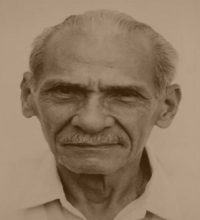With best wishes and a warm sendoff, early that day, we sailed on our last leg to General MacArthur’s GHQ and to freedom. We were assured that there were no Japs on any of the many islands that cluster the northern tip of Leyte.
The weather was fine. Wind just right. We sailed with joy in our hearts for, God willing, we would hit Leyte proper by sunset, at the latest. But we had to abate our joy, at least temporarily, for we heard a suspicious sound. It grew louder every second. We looked up at the skies and there, right ahead of us was a formation of low flying planes. Americans or Japs? Our hearts froze. We would be sitting ducks if they were Japs – and if they were Americans, who could assure us that we would be recognized as Filipinos.
The planes approached fast.
“Americans!” I shouted as I identified the lightnings by their twin bodies. Yes, they were the P-38s we had heard of so often over the radio and had read about in smuggled Life magazines. In a minute they were over our heads – the stars on their wings clearly visible. We waved frantically in an effort to disclose ourselves as friends and allies. Behind the P-38s trailed a slugging PBY. Some big shot being escorted, we conjectured.
As we sailed on, we saw more planes in the distance. They seemed to be everywhere.
I rested on my back, happy, confident that now no Japs could touch me, no son of Japan could prevent my reaching GHQ, Leyte. The enlarging mountains of Leyte, ever more visible, assured me even more.
In the distance, we could discern many sailboats coming and going. We thought that these sailboats must also be on missions like ours from other guerrilla units. Somehow, in our feeling of security, we did not fear that any of those boats could possibly be carrying escaping Japs. So we headed for the nearest one coming in our direction. From afar, we easily recognized the men on board as Filipinos. We waved and called to them. Cautiously, they approached us. We noticed their look of relief when they too recognized us as Filipinos. They were fishermen.
In answer to our eager inquiries, they told us the Japs were cornered at Ormoc and Palompon, that in Biliran, the biggest and nearest island of Leyte, there were some American soldiers and that it was clear of Japs.
This was enough. Biliran was only two hours away. Hurriedly, and with fevered excitement, we thanked them. It was low tide when we reached Biliran. We had to wade to shore. Once there, armed men who said that they were volunteer guards surrounded us and told us we were under arrest until we could properly identify ourselves. Immediately, I asked to be taken to their commanding officer or chief. We were led to the schoolhouse where we were introduced to a young man in his late teens whom they addressed as Colonel. We identified ourselves, my orders sufficing and then inquired if we could see the Commanding Officer of the American detachment. The Colonel said he could permit that only if the Americans (there were just five of them) wanted to see us, as they were merely an advance observation post and were very strict about security. The Colonel immediately sent a runner to the Americans with a note from me stating that we had vital information for GHQ at Leyte.
Just before dark, a runner came. He went straight to my father and greeted him. He said it was lucky he was with the American sergeant in-charge of the detachment when my note arrived. Recognizing my father’s name, he told the Americans that he knew my father. (He was a former prisoner of the Iwahig Penal Colony.) So the sergeant told him to come down and if we were the right party, to lead us to the top of the mountain where they were stationed.
It was dark and, therefore, the suggestion was made that we start the climb in the morning. “Nothing doing,” my father replied, “I am going to see those Americans tonight.”
The mountain was steep. Rain made the ascent slippery and muddy. In the darkness we groped. Occasionally, I rolled down a few feet when I missed the next step. Drenched and heavy with mud, we neared the top. Suddenly, from nowhere, we heard the metallic sound of guns cocking. We stood dead in our tracks. The Colonel, who personally guided us, shouted the password. Then, from somewhere, above a voice – a voice such as I hadn’t heard for years, hollered back, “Okay. Come on up.”
My heart beat faster. Never in my life did I feel so unreserved. My father and I rushed up, missed a step, fell, got up again and saw, right there in front of us, an American soldier, Tommy gun in hand.
Extending my hand, I introduced myself. I missed the name as I excitedly and with tears in my eyes embraced him. This was destination, reached. This was the end. This was freedom!
